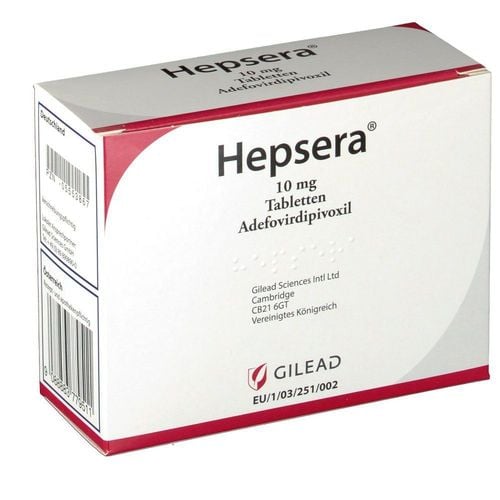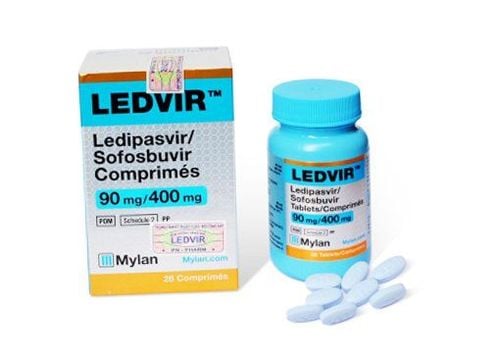This is an automatically translated article.
Article by Pharmacist Huynh Xuan Loc - Faculty of Pharmacy - Vinmec Central Park International General Hospital
Tenofovir alafenamide (abbreviated TAF, common brand names Hepbest, Teravir) is an antiviral drug belonging to the group of nucleotide reverse transcriptase inhibitor (NtRTI) used to treat chronic hepatitis B virus infection in adults. and children over 12 years old. TAF prevents the hepatitis virus from multiplying in the human body, thereby helping to reduce liver damage and control the disease.
1. Precautions when using Tenofovir alafenamide
Tenofovir alafenamide is a specialized drug that needs to be prescribed by a specialized doctor, so patients should not self-medicate. Moreover, the drug can cause side effects on the liver, kidneys, and other organs if not monitored by a specialist. Therefore, patients should have regular check-ups and should not abuse drugs for more than the prescribed time without consulting the treating doctor.
Patients should inform their doctor about a history of other diseases or dysfunctions of the liver or kidneys because TAF has a risk of exacerbating existing liver and kidney diseases. Patients also need to periodically take blood tests to evaluate liver function, kidney function before taking the drug and during follow-up visits.
In addition, your doctor may recommend that you be tested for hepatitis C , hepatitis D or even HIV before starting treatment.
Patients who are pregnant, suspected of being pregnant, or planning to have children should carefully consult their treating doctor about the use of TAF. Similar to the case of women who are breast-feeding, patients need to consult their doctor to make an appropriate decision weighing the benefits of treatment against the possible risks to the baby.
The drug may cause dizziness affecting the ability to drive or operate tools or other machines. Therefore, patients need to be careful when doing these things, especially in the first days of taking the drug.
TAF is used once a day and needs to be taken every day for the duration of treatment. Therefore, the patient should take the medicine at the same time of day and avoid forgetting the dose.
If you forget to take a pill, the patient should check the time of forgetting and take appropriate action:
If it is still about 18 hours from the time of forgetting to take the medicine, take a dose as soon as possible and take the dose. next at the usual time of taking the medicine (the next day); If it has been more than 18 hours since the time you forgot to take a pill, do not take the missed dose and wait to take your next dose at the time of your daily dose. In case the patient vomits within 1 hour of taking the drug, it is necessary to take an additional dose of the drug to make up for the lost drug. If vomiting occurs after 1 hour, the patient does not need to take the drug again.
Patients should not stop taking the drug during treatment without consulting the treating doctor. Inappropriate discontinuation of the drug can make hepatitis B worse or even life-threatening, especially in cases of advanced liver failure or cirrhosis.
Inform your doctor about possible side effects when taking the drug or unusual changes when stopping using the drug. These side effects can be caused by the drug or can also be a manifestation of uncontrolled hepatitis.
Medicines should be stored according to the manufacturer's instructions, kept in the original vial to avoid light and moisture from the outside environment.

Thuốc Tenofovir alafenamide cần được sử dụng theo đúng chỉ dẫn của bác sĩ
2. Tenofovir alafenamide side effects
Like any medicine, Tenofovir alafenamide can cause side effects when taken.
Headache is the most common side effect after taking TAF. Patients may also experience diarrhea, nausea, vomiting, dizziness, abdominal pain, bloating, joint pain or a rash, itchy skin.
Less common side effects include swelling of the face, lips or throat, and urticaria. If experiencing these symptoms or other common symptoms are more severe, the patient needs to go back to the doctor or go to the nearest medical facility for appropriate and timely treatment.
Another notable side effect of TAF is the effect on the liver causing elevation of liver enzymes (ALT), impaired kidney function or causing weight gain, changes in blood sugar, blood fats. That is also the reason why patients need to periodically re-examine and take medicine under the supervision of a specialist treating doctor.
3. Notable interactions of Tenofovir alafenamide
Patients need to inform the treating doctor about other drugs or supplements, products that the patient is taking to evaluate the interaction with Tenofovir alafenamide.
Important drugs to watch out for include:
Antibiotics, anti-tuberculosis drugs such as rifabutin , rifampicin or rifapentine; Antiretroviral drugs to treat HIV such as ritonavir, lopinavir, atazanavir; antifungal drugs such as ketoconazole or itraconazole; Medicinal preparations for the treatment of depression and anxiety disorders such as St John's Wort; Epilepsy drugs such as oxcarbazepine, carbamazepine, phenobarbital. These interactions may decrease or increase the concentration of TAF leading to decreased therapeutic effect or increased toxicity of TAF in the patient.
Caution should also be exercised when co-administering TAF with nonsteroidal anti-inflammatory drugs (NSAIDs) due to the increased risk of TAF nephrotoxicity.
If you have a need for consultation and examination at Vinmec Hospitals of the national health system, please book an appointment on the website (vinmec.com) for the best service.
Please dial HOTLINE for more information or register for an appointment HERE. Download MyVinmec app to make appointments faster and to manage your bookings easily.













